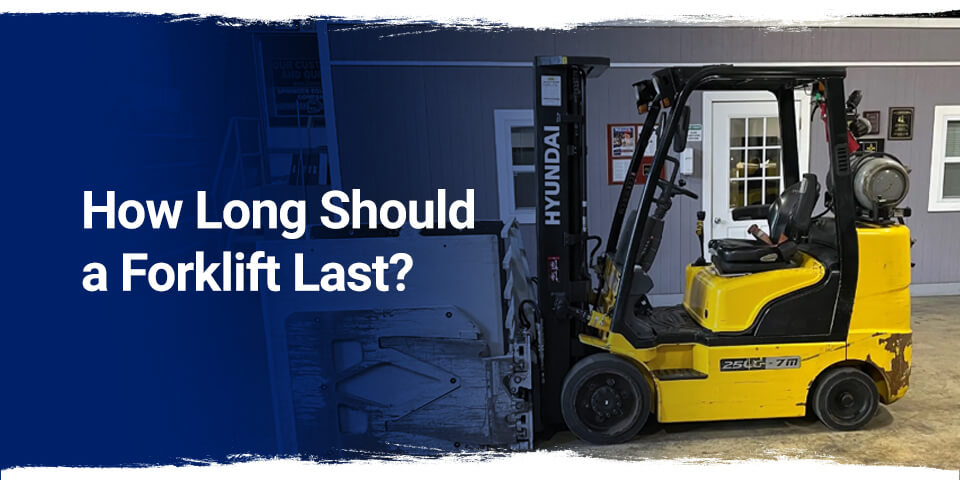
Most businesses depend on forklifts to pick up and transport heavy loads and perform other essential material handling tasks. Oftentimes, forklifts are pushed to their limits under challenging conditions, especially during peak periods when the work volume increases.
A forklift’s lifespan may be short compared to other equipment because of heavy demands and frequent use. Most models have a life expectancy of 10,000 service hours. Based on an eight-hour workday, this usage pattern means the forklift will last approximately five years. However, attentive preventive maintenance can extend the functioning period of time.
Should I Replace a Forklift?
As a business owner, keeping or getting rid of a forklift is not an easy decision. Trading in an older unit can contribute to the overall cost. Furthermore, you may still need to make a significant financial investment, especially if you want to upgrade to a brand-new or almost-new model. However, sometimes completing these transactions is the best long-term move for your company.
When Should You Replace a Forklift?
Besides the number of service hours, there are several telltale signs you may need a new forklift sooner rather than later.
Unsightly Appearance
Like many other business owners, you may be more concerned about the way your forklift performs than how it looks. But excessive exterior damage can point to underlying issues that indicate the need for an upgrade. For example, rapidly spreading rust can impact the lift truck’s structural integrity, making it unsafe to operate. Dents resulting from collisions with warehouse supports and other equipment can indicate damage to welding points or seals.
Fluid Leaks
Have you noticed puddles of oil, coolant or hydraulic fluid on the ground in the area where you park your forklifts? Leaks often indicate considerable damage to a vital component that may lead to mechanical failure. If you don’t see a leak but continue to frequently add fluids, your equipment is likely underperforming or damaged.
Worn or Damaged Forks
Given the importance of forks when lifting and carrying loads, this essential component must be in peak condition to optimize performance and maximize safety. Forks wear out over time. If you notice they are no longer straight or have cracks or other damage, it’s time for an upgrade.
More Frequent Repairs
Does it seem like the forklift spends as much, if not more time in the shop than it does on the job? If your equipment regularly breaks down or you’re spending more on maintenance to keep it running, it’s probably doing more harm than good for your business. A malfunction can be dangerous and jeopardize your workers’ safety. A replacement can be more economical overall and help you create a safer work environment.
Diminished Performance
In some cases, your forklift’s performance is no longer adequate enough to get the job done. If you’re constantly falling behind schedule because your equipment can’t keep up, it’s time to consider a replacement. Some warning signs include dropped loads, jerking motions when raising or lowering the fork and a sudden loss of power. The increased productivity from an upgrade can offset the cost of your purchase, ultimately resulting in your customers’ appreciation of the improved level of service provided.
Outdated Technology
Like most industries, material handling equipment manufacturers are constantly working to improve their models and provide more advanced features than the competition. While you may not need the latest and greatest forklift on the market, replacing an obsolete model with a newer one may be necessary to keep up with competitors. Safety enhancements to protect your workers is also something to consider.
Should I Buy a New or Used Forklift?
Once you realize it’s time for a forklift replacement, you’ll also need to determine whether a new or used model is the better option for your business. Sometimes, the choice is easy — like when you don’t have the funds to invest in the latest products.
Buying a brand-new forklift can make sense if your budget allows it and you want or need the following:
- Access to the most advanced technologies and features on the market
- The maximum life span a model can provide
- Lower initial maintenance and repair costs
- Fewer concerns about downtime resulting from mechanical failures
- Advanced safety features
On the other hand, purchasing a used forklift provides advantages as well:
- A lower upfront purchase price that could save your company thousands of dollars
- More comprehensive selection — you’re not limited to a handful of new models
- Less complicated to operate
- More cost-effective if you plan to use the equipment less frequently
- Easier to service since technicians don’t need to be familiar with the latest technology
Contact Springer Equipment for Used Forklifts
At Springer Equipment, we’ve sold dependable and affordable used forklifts for over 30 years. We have the experience and expertise to help you determine when to replace a forklift in your fleet. Contact us to learn more today.

